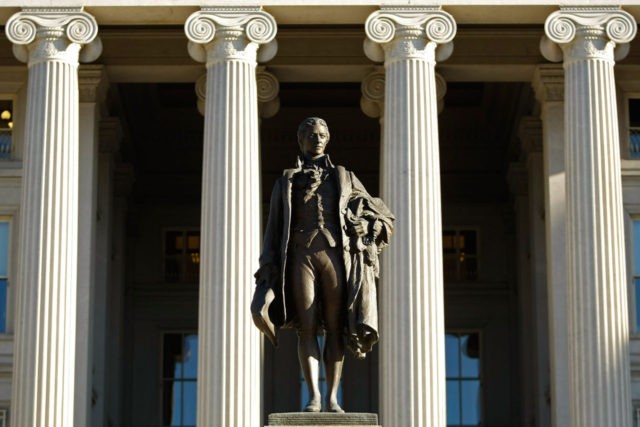When President Trump said on Sunday that America would consider stopping all trading with countries doing business with North Korea, critics responded by saying this would mean economic ruin for the United States.
This is a shocking admission that the cost of economic globalism has been the compromise of American independence.
And it should rally Americans to the cause championed by Donald Trump as he campaigned for the presidency, the cause of economic nationalism.
Consider that after decades of indoctrination about the blessings of global trade, Americans are now told that our economic prosperity is dependent on trade with foreign nations, particularly China. Free trade has shackled us from taking serious action to thwart North Korea’s nuclear ambitions.
The numbers are startling. China is North Korea’s largest trading partner–and Trump’s talk of cutting off trade was clearly aimed at China. But China is also the largest trading partner with the U.S., with nearly $650 billion in goods and services traded between the two nations. Countless more products in America contain parts assembled by Chinese workers. You may even be reading this on one of them.
“If bilateral trade between the U.S. and China goes away, American stores shelves are empty,” former Bush administration Treasury spokesman Taylor Griffin told NBC News recently. You’re not going to have anything to sell in Walmart…There’ll be no iPhone 8 for you.”
According to Griffin, if the U.S. cuts off trade with China, the consequences would be “apocalyptic.”
Trade dependency is not usually thought of as a feature of a free, independent nation. It is the property common to colonies dominated by empires. It is the condition that we rejected as a people in 1776.
Alexander Hamilton knew first hand the dangers of economic dependency. The Caribbean islands where he grew up manufactured nothing and were forced to import all of their supplies. As a result, they were easily dominated by far-off colonial powers. Even as the U.S. fought for its independence, our country depended on France and the Netherlands for manufactured goods. Our political independence won, Hamilton set out to establish our economic independence as well.
In an incredibly short period of time, that independence has been forsaken. We have become so dependent on trade with China, according to the president’s critics, that we face economic disaster if we try to break free from it. The country that defeated Hitler’s Germany, Imperial Japan, and Soviet Communism is not strong enough to cut off trade with China, they say.
Whatever the benefits of globalism may be, they have come at the cost of economic fragility and constrained American sovereignty.
Just as the weakness of subprime mortgage lenders and Bear Stearns illuminated the weakness at the heart of the American financial system, the crisis brought on by North Korea’s nuclear test has revealed an even deeper crisis for America. And just as we responded to our financial crisis by strengthening our banks and our financial safeguards to avoid ever again facing such peril, we should respond to this crisis by rebuilding America’s economic independence.
Otherwise, we might as well take down the statue of Hamilton that stands outside of the U.S. Treasury. Or at least drape it in a shroud to mourn the death of American independence.

COMMENTS
Please let us know if you're having issues with commenting.